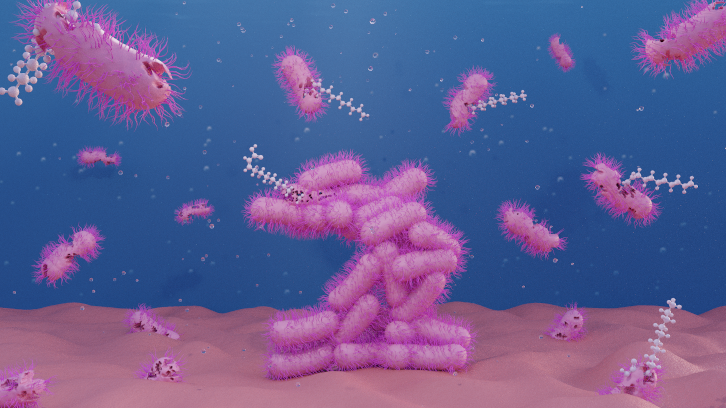Fighting bacterial infections based on the manipulation of the "quorum sensing" system

A study conducted by researchers from the Bacterial Pathogenesis and Antimicrobials Group at the IBB and the Department of Genetics and Microbiology at the UAB has made significant advances in the search for strategies to fight infections caused by pathogenic bacteria. The study reveals promising results in manipulating cellular communication in bacteria, a phenomenon known as "quorum sensing".
Certain pathogenic Gram-negative bacteria use QS signalling molecules such as the diffusible signal factor (DSF) to coordinate key activities like biofilm formation, antibiotic resistance, and virulence. In consequence, DSF family molecules are interesting targets for the development of antimicrobial strategies to address bacterial infections, especially those resistant to treatments.
Therefore, in our of Bacterial Pathogenesis and Antimicrobials Group at the Institute of Biotechnology and Biomedicine (IBB) and the Department of Genetics and Microbiology at the UAB in collaboration with the School of Pharmacy at the University College Cork in Ireland, have conducted a study focused on aromatic bioisosteres, compounds designed and synthesized from DSF backbones. The aim is to evaluate their impact on several bacterial strains of medical interest, including Escherichia coli, Acinetobacter baumannii, Pseudomonas aeruginosa, Stenotrophomonas maltophilia, Burkholderia cepacia, Burkholderia cenocepacia, among others.
The results highlight the ability of these new compounds to significantly reduce biofilm formation, with notable effects on A. baumannii and E. coli. Additionally, their interaction with colistin, a last-resort antibiotic, was explored, revealing remarkable improvements in colistin effectiveness when it was combined with some aromatic bioisosteres. These findings suggest a potential use for these compounds as enhancers in antibiotic therapies.
Our team also assessed survival in an infection model using Galleria mellonella larvae (wax worms), that has revealed that some compounds, such as tert-butylsulfonamide, increase survival when it is combined with colistin, indicating a possible application in in vivo treatments.
Our work, recently published in the European Journal of Medicinal Chemistry, represents a step forward in understanding bacterial communication and its manipulation to fight infections. We hope that these findings will stimulate the development of new therapeutic approaches and strategies to address the growing challenge of bacterial resistance, especially in hospital environments.
Celeste Gómez, Daniel Yero, Xavier Daura e Isidre Gibert
Institut de Biotecnologia i de Biomedicina (IBB)
Department of Genetics and Microbiology
Universitat Autònoma de Barcelona
Celeste.Gomez@uab.cat; Daniel.Yero@uab.cat; Xavier.Daura@uab.cat; Isidre.Gibert@uab.cat
References
Gómez AC, Horgan C, Yero D, Bravo M, Daura X, O'Driscoll M, Gibert I, O'Sullivan TP. 2023. Synthesis and evaluation of aromatic BDSF bioisosteres on biofilm formation and colistin sensitivity in pathogenic bacteria. Eur J Med Chem. 261:115819. doi: 10.1016/j.ejmech.2023.115819.

